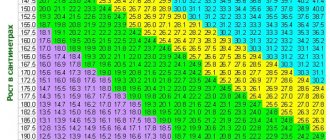The first thing happy parents tell relatives and friends about their newborn is the sex of the child, as well as his height and weight. Why are these numbers so important? Yes, because these are one of the first vital signs that can tell about the development and health of the baby.
Is it really important what weight gain will occur in newborns? Certainly! And during the first year, the baby will be repeatedly placed (placed) on scales to record his “achievements” in kilograms and grams.
First of all, the following factors influence the baby’s weight:
- Heredity. “Thin and fragile” parents most likely will not give birth to a 4-5 kg hero. And vice versa: strong, tall parents with “wide bones” are unlikely to have a slender, fragile baby.
- Gender of the child. Baby boys tend to be heavier and larger than newborn girls.
- Mom's health. The weight of the baby at birth may be insufficient or, on the contrary, too heavy if the mother suffers from diabetes or cardiovascular diseases, if there is a metabolic disorder, hypertension or Rh incompatibility.
- Number of kids. The more babies the mother carries, the less weight each will have.
- Diet of the expectant mother. Excess carbohydrates in mother's food can cause excess weight in the newborn. A lack of vitamins in the mother's diet will lead to weight deficiency.
- Placenta. If the transport of nutrients to the baby from the mother is disrupted, developmental delays occur.
- Bad habits of parents (especially mothers). Smoking, alcohol and coffee abuse lead not only to weight loss and premature birth, but also to developmental disorders.
- Number of mother's pregnancies. With each subsequent pregnancy, a larger baby is born than the previous one.
- Fetal health. Various diseases of the baby in the womb can lead to insufficient (for example, infections or malnutrition) or excess (for example, Down syndrome) weight.
- Excessive weight gain by the mother during pregnancy. A mother’s gain of 15-20 kg provokes a decrease in the baby’s oxygen supply in the womb. How many kg of weight should a woman gain during pregnancy - norms and deviations of weight gain during pregnancy
- Post-term pregnancy or premature birth. A premature baby will be underweight, a post-term baby will weigh more than normal.
Growth of boys up to one year by month. WHO table
| Age | Very short height (cm) | Below average height (cm) | Average height (cm) | Above average height (cm) | Tall (cm) | Very tall (cm) |
| Newborn | 46,1 | 48 | 49,9 | 51,8 | 53,7 | 55,6 |
| 1 month | 50,8 | 52,8 | 54,7 | 56,7 | 58,6 | 60,6 |
| 2 months | 54,4 | 56,4 | 58,4 | 60,4 | 62,4 | 64,4 |
| 3 months | 57,3 | 59,4 | 61,4 | 63,5 | 65,5 | 67,6 |
| 4 months | 59,7 | 61,8 | 63,9 | 66 | 68 | 70,1 |
| 5 months | 61,7 | 63,8 | 65,9 | 68 | 70,1 | 72,2 |
| 6 months | 63,3 | 65,5 | 67,6 | 69,8 | 71,9 | 74 |
| 7 months | 64,8 | 67 | 69,2 | 71,3 | 73,5 | 75,7 |
| 8 months | 66,2 | 68,4 | 70,6 | 72,8 | 75 | 77,2 |
| 9 months | 67,7 | 69,7 | 72 | 74,2 | 76,5 | 78,7 |
| 10 months | 68.7 | 71 | 73,3 | 75,6 | 77,9 | 80,1 |
| 11 months | 69,9 | 72,2 | 74,5 | 76,9 | 79,2 | 81,5 |
| 1 year | 71 | 73,4 | 75,7 | 78,1 | 80,5 | 82,9 |
This loss of initial (at birth) weight has 3 degrees:
- 1st: with a loss of less than 6 percent. Symptoms: slight dehydration, mild restlessness and extreme feeding greed.
- 2nd: with a loss of about 6-10 percent. Symptoms: thirst, pale skin, rapid breathing.
- 3rd : with weight loss - more than 10 percent. Symptoms: extreme thirst, dry skin and mucous membranes, fever, rapid heartbeat.
Doctors at the maternity hospital will understand within 3-4 days whether weight loss is critical or normal.
Weight of girls under one year old by month. WHO table
| Age | Very low weight (kg) | Weight below average (kg) | Average weight (kg) | Weight above average (kg) | High weight (kg) | Very high (kg) |
| Newborn | 2,4 | 2,8 | 3,2 | 3,7 | 4,2 | 4,8 |
| 1 month | 3,2 | 3,6 | 4,2 | 4,8 | 5,5 | 6,2 |
| 2 months | 3,9 | 4,5 | 5,1 | 5,8 | 6,6 | 7,5 |
| 3 months | 4,5 | 5,2 | 5,8 | 6,6 | 7,5 | 8,5 |
| 4 months | 5 | 5,7 | 6,4 | 7,3 | 8,2 | 9,3 |
| 5 months | 5,4 | 6,1 | 6,9 | 7,8 | 8,8 | 10 |
| 6 months | 5,7 | 6,5 | 7,3 | 8,2 | 9,3 | 10,6 |
| 7 months | 6 | 6,8 | 7,6 | 8,6 | 9,8 | 11,1 |
| 8 months | 6,3 | 7 | 7,9 | 9 | 10,2 | 11,6 |
| 9 months | 6,5 | 7,3 | 8,2 | 9,3 | 10,5 | 12 |
| 10 months | 6,7 | 7,5 | 8,5 | 9,6 | 10,9 | 12,4 |
| 11 months | 6,9 | 7,7 | 8,7 | 9,9 | 11,2 | 12,8 |
| 1 year | 7 | 7,9 | 8,9 | 10,1 | 11,5 | 13,1 |
Why does a baby lose weight after birth?
The main reasons include:
- Adaptation to the extrauterine world. For a baby, living outside the mother in the first days of life and actively sucking (instead of passively receiving nutrition through the mother) is serious work with a serious load, which naturally leads to weight loss.
- Strengthening metabolism in the baby's body. And, accordingly, high energy consumption, which also leads to weight loss.
- Insufficient replenishment of fluid balance. The baby breathes on his own, sweats, pees, burps - but at the same time does not receive the required amount of fluid, because the mother’s milk does not appear immediately (first, as you know, colostrum comes). In addition, it is rare that a mother can boast of good lactation in the first days. It is important to understand that about 60 percent of all weight loss is fluid loss through the skin, which will increase if the air in the room is too dry or too hot.
- Sluggish breastfeeding by the baby in the first days. Firstly, the baby is still learning to eat, secondly, he is getting used to the new world, and thirdly, he still needs to learn how to suck.
How to measure the height of a newborn?
Correct measurement of parameters is a prerequisite for an objective assessment of the baby’s growth.
There are no questions about how to measure a child’s body weight: in the pediatrician’s office there are always special scales for weighing infants. It’s even easier for those mothers who have such scales at home.
Measuring a baby's height is much more difficult, especially when it comes to children who have not yet learned to hold their head up on their own and still press their arms and legs to their body. To find out the height of an infant, you need to place him on a hard surface (for example, a table covered with a flannel blanket). The baby's head should rest against the wall.
Interesting! Baby development at 5 months
Gently extend his leg in a straight line, so that the foot forms a right angle with the surface of the table.
Take chalk and make marks near the baby's heel and head. Measure the distance between the marks and compare the resulting figure with previous indicators. If a mother has doubts that she measured the baby’s height correctly, she should entrust this procedure to a pediatrician.
The child is not gaining weight well – possible reasons:
- A mother's milk deficiency is insufficient lactation. How to increase lactation - all available methods
- Low fat content of mother's milk. This is my mother’s fault - you should diversify your diet and eat high-calorie foods. Diets during this period are unacceptable.
- Poor absorption of food in the baby’s body due to dysbiosis or other problems.
- Poor organization of feeding. For example, the mother feeds the baby incorrectly, she is distracted, the child is uncomfortable eating, etc.
- Frequent regurgitation. You can’t put the baby to bed right after “dinner” - first you should hold the child vertically for 10 minutes, like a “soldier,” holding him close to you. This is necessary for the absorption of milk and the release of excess air.
- Too strict feeding regime. It is certainly necessary to accustom your child to a routine. But not in the first days after discharge from the hospital. It's too early to leave your child without nighttime snacks. In addition, do not rush to tear your baby off the breast at the time of “lunch”: there are leisurely babies who suck very slowly and are full only after 40 minutes.
- The baby is sucking incorrectly. The mother should consult with the pediatrician to understand how to properly give the baby a nipple so that sucking is complete.
- Development of neurological diseases. Typically, poor feeding quality is affected by problems with coordination of the facial muscles, as well as underdevelopment of specific areas of the oral apparatus.
- Infectious, viral or other disease.
- Formula milk is not suitable for a formula-fed baby.
- Stress. At such a young age, even swimming or massage can become physical stress for the little one.
Growth of girls up to one year by month. WHO table
| Age | Very short height (cm) | Below average height (cm) | Average height (cm) | Above average height (cm) | Tall (cm) | Very tall (cm) |
| Newborn | 45,4 | 47,3 | 49,1 | 51 | 52,9 | 54,7 |
| 1 month | 49,8 | 51,7 | 43,7 | 56,6 | 57,6 | 59,5 |
| 2 months | 53 | 55 | 57,1 | 59,1 | 61,1 | 63,2 |
| 3 months | 55,6 | 57,7 | 59,8 | 61,9 | 64 | 66,1 |
| 4 months | 57,8 | 59,9 | 62,1 | 64,3 | 66,4 | 68,6 |
| 5 months | 59,6 | 61,8 | 64 | 66,2 | 68,5 | 70,7 |
| 6 months | 61,2 | 63,5 | 65,7 | 68 | 70,3 | 72,5 |
| 7 months | 62,7 | 65 | 67,3 | 69,6 | 71,9 | 74,2 |
| 8 months | 64 | 66,4 | 68,7 | 71,1 | 73,5 | 75,8 |
| 9 months | 65,3 | 67,7 | 70,1 | 72,6 | 75 | 77,4 |
| 10 months | 66,5 | 69 | 71,5 | 73,9 | 76,4 | 78,9 |
| 11 months | 67,7 | 70,3 | 72,8 | 75,3 | 77,8 | 80,3 |
| 1 year | 68,9 | 71,4 | 74,0 | 76,6 | 79,2 | 81,7 |
Reasons for baby gaining weight too quickly
Oddly enough, too much weight gain is also not very good.
The reasons for this violation may be:
- Physiological feature of development.
- Higher growth rates compared to the norm.
- Artificial feeding (an artificial baby always gets better faster than breastfed babies).
- Excessive feeding - formula or breast milk. It is extremely difficult to overfeed a child with breast milk, but it is possible if feedings are on demand, quite frequent and long, and there is more hind milk (more high-calorie) in percentage terms than fore milk.
- Poor quality of the mixture.
It is important to understand that too rapid weight gain in a baby can indicate various diseases, including thyroid disease!
Therefore, this issue cannot be ignored if...
- The baby is gaining weight too quickly, and you can see it yourself, including by comparing his weight with the norm table.
- Along with rapid weight gain, there are other symptoms that worry you.
- Skin color is unhealthy.
- There are changes in the dynamics of nail growth.
- The child is whiny and his mood changes frequently.
- There were problems with stool.
- The color of the urine is alarming.
- There are questions about the compliance of the child’s mental development with norms.
It is also important to understand that graphs and tables of weight gain for newborns are not a 100% standard, and all data are presented in their average form. If the baby is alert, sleeps and eats well, has normal skin and urine color, regular bowel movements, excellent mood, and no signs of illness, do not panic.
Of course, seeing a doctor if your weight deviates greatly from the norm is necessary, but panic will be unnecessary.
In most cases, the pediatrician changes the feeding pattern or regimen - and weight gain returns to normal levels.
The site Colady.ru warns: all information on the site is for informational purposes only and is not a guide to action. Only a doctor can give you an accurate diagnosis. We kindly ask you not to self-medicate, but to make an appointment with a specialist! Health to you and your loved ones!
Weight gain and growth
In the first month, a newborn boy should have weighed 770–1450 grams, and a girl 670–1270 grams (see table).
Gain rates for the first month
| Weight gain, kg | Short | Average | Big |
| boy | 0,38 – 0,76 | 0,77 – 1,45 | 1,46 – 1,76 |
| girl | 0,40 – 0,66 | 0,67 – 1,27 | 1,28 – 1,58 |
* The table shows weight gain from birth to 30-31 days
If the weight gain turns out to be low or large , then the doctor must perform a thorough diagnosis and give his recommendations for feeding.
If the weight gain does not fit into the normal range (less than 380 grams), then feeding recommendations are not enough. It is necessary to undergo tests and conduct a full diagnosis to find or exclude hidden problems, indolent diseases and dehydration.
The following table shows the norms of weight gain for the coming month:
Norms of weight gain for children from 1 to 2 months
| Weight gain, kg | Short | Average | Big |
| boy | 0,56 – 0,81 | 0,82 – 1,38 | 1,39 – 1,69 |
| girl | 0,44 – 0,67 | 0,68 – 1,18 | 1,19 – 1,44 |
*Indicated weight gain from 30th to 61st days from birth
In the first months after birth, babies gain weight very unevenly, so it is recommended to weigh them every week.
Below is a fragment of the weekly weight gain table corresponding to this period of life. Weekly weight gain of newborns in grams
| Period | Boy | Girl |
| 1 Week | 150 ± 150 | 100 ± 100 |
| 2 week | 250 ± 100 | 200 ± 100 |
| 3 week | 320 ± 80 | 270 ± 70 |
| 4 week | 320 ± 80 | 270 ± 70 |
| 5 week | 250 – 340 | 210 – 300 |
| week 6 | 230 – 320 | 200 – 280 |
| week 7 | 215 – 290 | 180 – 260 |
| 8 week | 200 – 270 | 170 – 240 |
Starting from the first month (from the fifth week), the boy should gain weight by 200-340 grams per week, the girl - by 170-300 g. Over the entire coming month, the boy will have to gain 960-1300 grams in weight and 3.8 cm in height, the girl is 800–1160 g and 3.5 cm.











